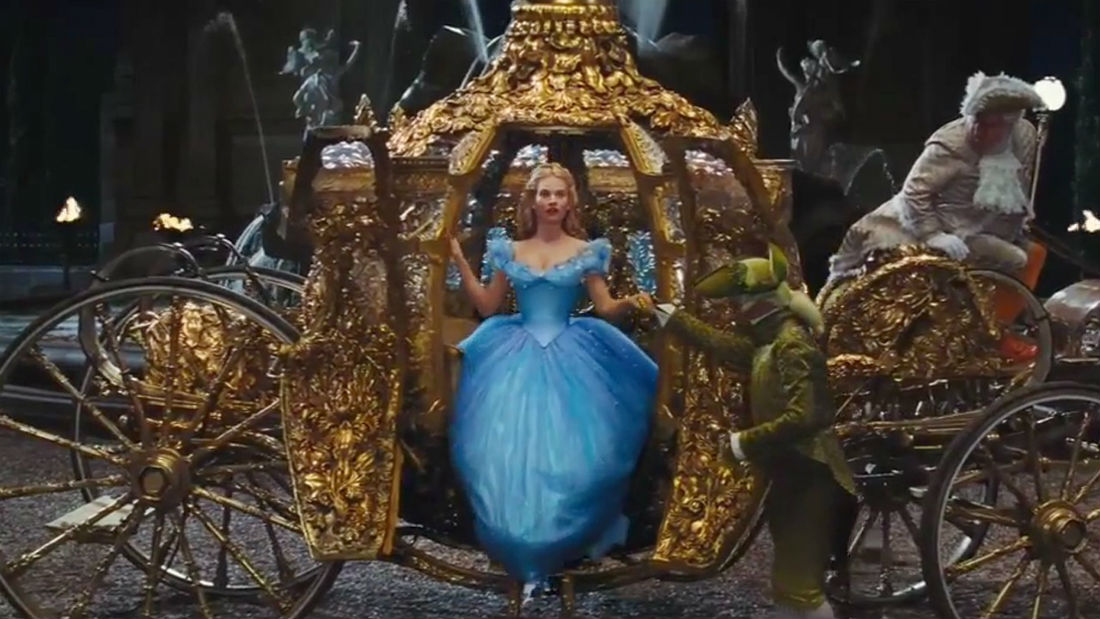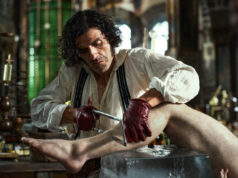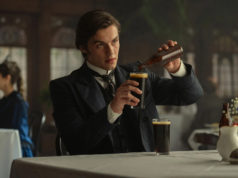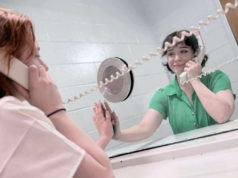I mentioned in my review of the new Cinderella that the story had been told many times before, modernized, tweaked, and otherwise adulterated in every possible way. Anna Kendrick said in an interview last winter that each generation got the Cinderella that it needed. I thought I’d go back and see how true that is by comparing other versions of Cinderella that have been done over the years and see how they have evolved through time. This list covers only a small fraction of all the Cinderella stories that are out there ― this movie doesn’t include the ballet and opera versions of the story, nor does it include the Rodgers and Hammerstein musical written for TV (possibly the least of their scores), nor the 2004 contemporary update A Cinderella Story (I saw it back then and had a bad enough time that I didn’t feel like going back). I’ve listed actors in this order: Cinderella, wicked stepmother, prince, stepsisters, and fairy godmother.
Cinderella (1949)
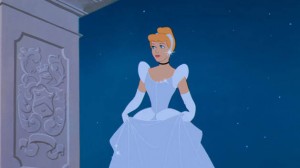
Directors: Clyde Geronimi, Wilfred Jackson, and Hamilton Luske.
Cast: Ilene Woods, Eleanor Audley, Mike Douglas, Rhoda Williams, Lucille Bliss, Verna Felton.
Notes: This film would not pass muster today, and it’s not because of its gender politics. No, it’s just an astonishingly poor piece of storytelling. At only 75 minutes, the movie is still stuffed with filler material involving Cinderella’s insufferably cute pet mice. The filmmakers assume that you’re already familiar with the story, so they don’t bother giving characters proper introductions. Our heroine herself is meant to be depicted as kind, but instead she comes off as simpering, breaking down in tears whenever anything bad happens. Seriously, the only thing she does to catch the prince’s eye is to look pretty in that dress. Oh, and the prince’s royal dad is in severe need of heavy psychiatric drugs. Moods that change as quickly as his are not something you want in a king.
Message: Prince Charming is such a nonentity here that the movie winds up sending a weird message: If you marry a rich, handsome guy, his personality doesn’t matter at all. I suppose that’s in keeping with the roles that women were expected to play in 1950s America.
Cinderfella (1960)
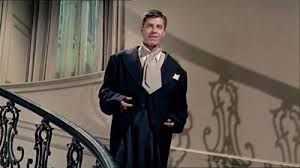
Director: Frank Tashlin.
Cast: Jerry Lewis, Judith Anderson, Anna Maria Alberghetti, Robert Hutton, Henry Silva, Ed Wynn.
Notes: Gender flip! Unfortunately, it’s not nearly as radical as you might think. Lewis plays a dimwitted guy named Fella living in an L.A. mansion off the charity of his terrible stepmother and coddled stepbrothers. Lewis’ personality is a lot to take ― the mugging, the need to be loved, the insistence on singing that came after his acrimonious professional breakup with Dean Martin. However, you can also see just how preternaturally gifted a physical comic he was, and in Tashlin he had a director who was brilliant at setting up gags. Check out how much he makes out of a bit with double doors that won’t close or one where he’s carrying a heavy breakfast tray, and be amazed.
Message: The fairy godfather at one point rails against the whole Cinderella myth, blaming it for women’s unrealistic expectations and for making their schlumpy non-Prince Charming husbands miserable as a result. He’s bestowing his good fortune on Fella as a means of revenge for all those miserable husbands. Fairy godfather is a horrible old misogynist, but he’s not wrong. Even so, with changing notions of gender, the story seems ripe for another male version.
Donkey Skin (1970)
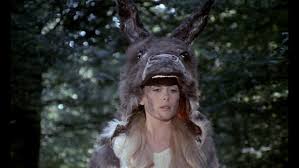
Director: Jacques Demy.
Cast: Catherine Deneuve.
Notes: I’m cheating a bit here ― this French musical is actually based on a different fairy tale by Charles Perreault about a princess disguising herself as a scullery maid wearing a bad-smelling donkey skin. Still, I’m including this because it incorporates lots of elements of Perreault’s Cinderella story, like the fairy godmother and a Prince Charming who finds his perfect wife by making the whole kingdom come in for a fitting (for a ring rather than a slipper). Deneuve had collaborated with Demy and composer Michel Legrand on one of the greatest musicals ever, The Umbrellas of Cherbourg. The level of musical inspiration isn’t the same here, but just look at this thing. The costumes are outrageously opulent, and Deneuve looks particularly beautiful as well. This is the most visually rewarding of these films.
Message: The prince’s first view of Donkey Skin is in her private hut, where she still dresses like a princess, so he doesn’t get any points for marrying below his station. There is the weirdness of Donkey Skin fleeing her castle because her newly widowed father has gone insane with grief and declared his intention to marry his own daughter. She’s actually on board with that plan before fairy godmother warns her (in a cheerful song) about deformed children.
The Slipper and the Rose (1976)
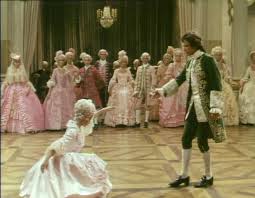
Director: Bryan Forbes
Cast: Gemma Craven, Margaret Lockwood, Richard Chamberlain, Rosalind Ayres, Sherry Hewson, Annette Crosbie.
Notes: This British musical proceeds from the assumption that the prince is as fascinating as the servant girl. It’s an interesting idea. It doesn’t work. Supposedly when this musical was screened for the British royal family, the Queen Mother told the screenwriters that the ballroom waltz was the most beautiful song she’d ever heard. Can’t say much for the Queen Mum’s musical taste; the songs here were written by Richard and Robert Sherman, and they’re far from the best work by the Mary Poppins songwriters. (“Protocoligorically Correct,” you are no “Supercalifragilisticexpialidocious.”) With the characters decked out in 18th-century finery, this thing is so flat that Richard Chamberlain is the most dynamic presence onscreen. That’s not a good sign.
Message: The movie’s obsessed with the problem of a royal marrying a commoner, as the prince’s predicament is mirrored in the subplot with his valet (Christopher Gable) falling in love with a woman of noble birth. Many Britons at the time could remember Edward VIII abdicating to marry Wallis Simpson, so this hang-up of the movie’s is somewhat understandable. Still, it’s a strange thing to obsess about.
Ever After (1998)
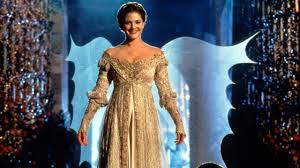
Director: Andy Tennant.
Cast: Drew Barrymore, Anjelica Huston, Dougray Scott, Megan Dodds, Melanie Lynskey.
Notes: Realism is always a relative term when talking about Cinderella stories, but this version aims for a more realistic version of the tale. So, no musical numbers and no fairy godmother turning a pumpkin into a carriage here, just a historically accurate rendering of 16th-century France, with Barrymore playing a merchant’s daughter named Danielle who poses as a countess and accidentally catches the prince’s eye. I like the character work on the stepsisters; Dodds makes the most hateful stepsibling in all these movies, and Lynskey is the less-pretty sister who’s resentful enough about being overlooked to turn on her family and take Cinderella’s side. There’s a great moment, too, when Danielle makes a triumphant appearance at the ball, and while the crowd sees a girl in a resplendent gown with wings, the camera catches her looking terrified and telling herself, “Just breathe.” For all its patches of bad writing and Barrymore’s one-note performance, this version holds up very well.
Message: Revolutionary. Danielle may not take up the cause of women, but she is a highly educated young woman who reads Thomas More, and she teaches the sheltered prince that since his subjects allow him to live in his cushy existence, he’s obligated to make their lives better. It works very well ― the prince goes from saying, “They’re servants. It’s what they do,” to vowing to fund a public university. If you’re looking for a feminist revision of the story, this is your best bet.
Ella Enchanted (2004)
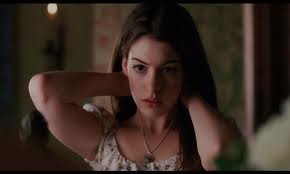
Director: Tommy O’Haver.
Cast: Anne Hathaway, Joanna Lumley, Hugh Dancy, Lucy Punch, Jennifer Higham, Vivica A. Fox.
Notes: I remember giving this movie a good review when it came out. What was I thinking? Heavily influenced by Shrek, this leaden adaptation sinks under the weight of lame topical jokes (like a beauty cream called “Batox”) and modern references, like when the kingdom opens a RenFaire version of a shopping mall, complete with working escalator. The only part that still holds up today is when Hathaway lets down her hair and sings “Somebody to Love” for a party of giants, you can’t help but think, “This girl’s gonna be a star.”
Message: This is based on Gail Carson Levine’s novel, in which Ella operates under a curse where she’s forced to do whatever people tell her to do. The way she breaks the curse is delightful on the page, but it has no power here. Instead, Ella leads a revolt of enslaved elves and giants against a tyrant (Cary Elwes, in a nod to The Princess Bride) who wants to poison Prince Charming and keep power for himself. This movie’s heart is in the right place, but it really is a shame about the execution.
Into the Woods (2014)
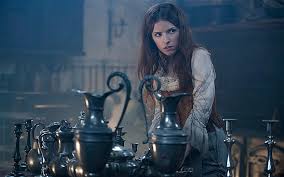
Director: Rob Marshall.
Cast: Anna Kendrick, Christine Baranski, Chris Pine, Lucy Punch, Tammy Blanchard, Joanna Riding.
Notes: Stephen Sondheim’s music gives this movie a huge built-in advantage over the others; Cinderella’s kindness is never more powerfully demonstrated than when she sings “No One Is Alone” to a grieving Little Red Riding Hood. Of course, here her story is mixed in with various other fairy tales. In keeping with the Grimm brothers’ version of the story, the wicked stepsisters are punished by having their eyes pecked out by birds. Meanwhile, “On the Steps of the Palace” makes Cinderella into a dithering girl who intentionally leaves her shoe for the prince to find so that the prince can track her down instead of her having to choose to leave her family.
Message: Cinderella marries Prince Charming, only to discover that he’s a narcissistic serial adulterer. This development underscores how little choice she has in her fate; her family is so awful that she’ll marry anybody to get away from them. Sondheim effectively turns this couple into one of those neurotic, dissatisfied married couples from one of his more adult musicals like Company or Follies. In doing so, his show and the resulting movie make Cinderella strangely modern.



